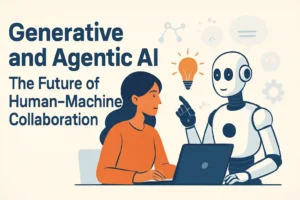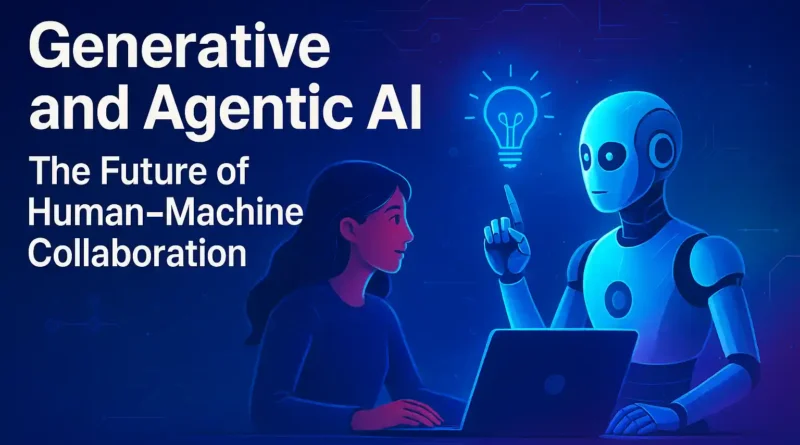Generative And Agentic AI
Generative And Agentic AI : The Future of Human–Machine Collaboration
Artificial Intelligence (AI) has been evolving at a breathtaking pace. Not long ago, AI was mainly about automation—machines doing repetitive tasks faster than humans. But now, we’re entering a new era: Generative and Agentic AI. These aren’t just buzzwords; they’re redefining how businesses, creators, and individuals interact with technology. In this post, we’ll explore what these two terms really mean, how they differ, and why they’re likely to shape the next decade of digital transformation.
What is Generative AI?
Generative AI refers to systems that can create new content—text, images, music, code, even video—by learning from existing data. Unlike traditional AI that simply classifies or predicts outcomes, generative AI is about producing original outputs that didn’t exist before. Think of tools like: ChatGPT for writing and conversation DALL·E or MidJourney for creating images Synthesia for generating videos Aiva for composing musicThese systems don’t just copy-paste data; they generate something new based on patterns learned during training.
Why Generative AI Matters
Generative AI has made creative tasks faster and more accessible. Writers use it to draft blogs, marketers to create ads, and developers to generate code snippets. It’s not perfect, but it acts like a supercharged assistant that saves time while boosting productivity.
What is Agentic AI?
If generative AI is about creation, then agentic AI is about action. Agentic AI systems can take instructions and then act autonomously to complete tasks, often without constant human supervision. Instead of just generating content, these AIs can plan, execute, and adapt to achieve goals. For example:
- A customer service bot that doesn’t just reply but can resolve issues like resetting a password or processing a refund.
- A financial AI agent that analyzes markets, makes investment recommendations, and executes trades within defined limits.
- A personal AI assistant that schedules your meetings, books tickets, orders groceries, and learns from your preferences over time.
This is the closest step we’ve seen toward “digital employees” or AI co-workers.
Generative AI vs. Agentic AI: The Key Differences
| Feature | Generative AI | Agentic AI |
| Core Purpose | Create new content (text, images, code, etc.) | Perform tasks, take actions, and make decisions |
| Input/Output | Input = prompt, Output = content | Input = goal, Output = task execution |
| Human Involvement | Requires frequent guidance | Can work autonomously |
| Examples | ChatGPT, MidJourney, Stable Diffusion | AutoGPT, BabyAGI, AI-powered agents in CRMs |
In simple terms: Generative AI writes the script; Agentic AI performs the play.
 Generative And Agentic AI
Generative And Agentic AI
Why the Combination of Generative And Agentic AI is Powerful
Individually, both technologies are impressive. But together, they’re revolutionary. Imagine a future where: Generative AI drafts a detailed marketing campaign, and Agentic AI then runs it—publishing posts, placing ads, tracking performance, and making adjustments in real time. A lawyer uses generative AI to draft contracts, while agentic AI negotiates with other AI agents to finalize deals. A student asks generative AI to explain a subject, and agentic AI goes further—signing them up for online courses, scheduling study reminders, and even practicing quizzes interactively. This blend of creativity and autonomy has the potential to create self-sustaining systems that not only produce ideas but also implement them.
Real-World Applications
1. Healthcare Generative AI can analyze medical images and suggest diagnoses. Agentic AI can then schedule follow-up tests, notify patients, and update medical records automatically.
2. Finance Generative AI generates reports and risk models. Agentic AI executes transactions, optimizes portfolios, and monitors compliance.
3. Education Generative AI creates personalized study materials. Agentic AI becomes a virtual tutor, assigning practice tasks and tracking student progress.
4. Business & Productivity Generative AI writes proposals and presentations. Agentic AI handles client follow-ups, sends reminders, and books meetings.
Challenges & Concerns of Generative AI And Agentic AI
While the possibilities are exciting, we need to address the risks.
1. Bias & Accuracy – Generative AI sometimes produces wrong or biased outputs. Agentic AI acting on incorrect data can cause real-world harm.
2. Ethics & Responsibility – Who’s accountable if an AI agent makes a costly mistake?
3. Job Impact – Some routine roles may be replaced, though new AI-related jobs will emerge.
4. Security Risks – Autonomous agents could be misused for scams, fraud, or cyberattacks. These challenges highlight why human oversight is still critical, even as AI systems grow more capable.
The Road Ahead of Generative AI And Agentic AI
Generative And agentic AI are not competing; they’re complementary. The future will likely see them merging into hybrid systems that can both create and act. Businesses will adopt “AI teams” handling projects end-to-end. Consumers will interact with AI as naturally as with human assistants. Regulations will emerge to ensure ethical use and prevent abuse. Just as the internet once transformed how we work, shop, and communicate, this new wave of AI is set to reshape the foundations of daily life.
Final Thoughts
We are standing at the edge of a new AI revolution. Generative AI brings imagination; Agentic AI brings execution. Together, they promise not just smarter machines, but more productive and creative humans. Instead of asking “Will AI replace us?”, the better question is: “How can we collaborate with AI to achieve more than ever before?”
FAQs on Generative And Agentic AI
Is agentic AI the same as AGI (Artificial General Intelligence)?
No. Agentic AI can perform tasks independently but still within defined boundaries. AGI refers to machines with human-level general intelligence, which we haven’t achieved yet.
Can generative AI replace human creativity?
Not entirely. It can speed up the process, but true creativity still requires human originality, context, and emotional depth.
Will agentic AI take over jobs?
Some jobs will change, but history shows technology creates new opportunities too. Roles in AI development, oversight, and strategy will grow.
How can businesses start using these technologies?
Start small. Use generative AI for content creation or data analysis, and gradually explore agentic AI tools for automation and decision-making.
Which industries will benefit the most?
Healthcare, finance, education, retail, and customer service are already leading adopters.
Also Read……
- Agentic AI – The Next Shift in Artificial Intelligence
- Pixel 10 Series Launched in India – Flagship with Tensor G5 & Qi2 Magnetic Charging
- Redmi 15 5G India Launch Teaser Full Specs Leak
- Vivo V60: A Game-Changing Mid-Range Smartphone in 2025
You Can also Visit Sarkari Results For Job related Query. you can follow us on Google news. Share our post. We will be thankful to all of you.

